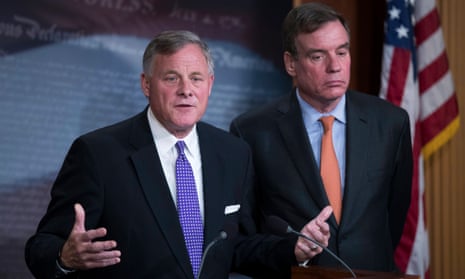The Senate intelligence committee has said it has confidence in an US agency finding earlier this year that Russia intervened in the US presidential election in an effort to skew the vote in Donald Trump’s favour.
The committee chairman, Republican senator Richard Burr, said it remained an “open question” whether there was collusion by the Trump campaign with Moscow. But he added that Russian intelligence could threaten the next round of congressional elections next year.
“We’ve got to make our facts, as it related to Russia’s involvement in our election, before the primaries getting started in 2018,” Burr said. “You can’t walk away from this and believe that Russia’s not currently active.”
Burr said that the committee was making substantial progress in various areas of investigation.
But he added that it “had hit a wall” in its efforts to talk to Christopher Steele, the former UK intelligence officer whose reports on allegations of active collusion involving Trump himself have become part of the continuing investigations being conducted by the Senate, House of Representatives, and the special counsel, Robert Mueller.
“The committee cannot really understand the credibility of the dossier without understanding who paid for it and who were your sources and sub-sources,” Burr said. “I strongly suggest that you come in and speak with us.”
Steele is reported to have spoken to FBI officials about his findings and given them information on his sources.
Burr conceded that he could not force Steele to come to the US to testify but he threatened that his committee’s report “won’t be flattering” about him if he continued to refuse to cooperate.
Burr and the ranking Democrat on the Senate intelligence committee, Mark Warner, stressed the huge volume of material its staff had analysed, interviewing more than 100 people and assessing over 100,000 documents, and how much further there was to go. The committee hopes to talk to 25 more witnesses later this month.
However, Burr said the committee had come to a conclusion on at least one issue: that it had faith in the conclusions of the intelligence community assessment (ICA) presented by the CIA, FBI and NSA to Barack Obama and Donald Trump in January.
That assessment found that Vladimir Putin and the Russian government had intervened extensively in the presidential election and “aspired to help president-elect Trump’s election chances when possible by discrediting secretary Clinton and publicly contrasting her unfavorably to him”.
“There is consensus among members and staff that we trust the conclusions of the ICA,” Burr said. It was a significant statement from a senior Republican, as the president has dismissed accounts of Russian meddling in the election as “a hoax”.
“The issue of collusion is still open. We continue to investigate both intelligence and witnesses,” Burr said. But he added that the 2016 election demonstrated “the Russian intelligence service is determined, clever and I recommend every campaign and every elected official take this seriously”.
Warner focused on the Russian use of social media, through paid advertising and fake accounts to drive fake stories and “sow chaos and division in our country”.
CNN reported on Wednesday that several Russian-linked Facebook ads, specifically targeted two critical swing states in the election campaign, Michigan and Wisconsin, and were “highly sophisticated” in focusing on key demographic groups in those states. The ads promoted racially divisive, particularly anti-Muslim messages.
A number of Russian-linked Facebook ads specifically targeted Michigan and Wisconsin, two states crucial to Donald Trump’s victory last November, according to four sources with direct knowledge of the situation.
Facebook has handed over 3,000 ads that are believed to have been linked to a shadowy Russian entity called the Internet Research Agency, and Facebook staff have been interviewed by committee staff. The committee has asked executives from Facebook, Twitter and Google to appear before it on 1 November, and Facebook announced on Wednesday that it would attend.
“I was concerned at first that some of these social media platform companies did not take this threat seriously enough,” Warner said “I believe they are taking it seriously now.”
